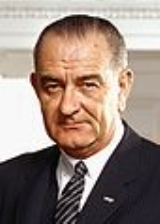
Lyndon B. Johnson
Lyndon Baines Johnson , often referred to as LBJ, was the 36th President of the United States after his service as the 37th Vice President of the United States...
Timeline of Events
|
1963
|
|
||||||
|
1964
|
|
||||||
|
1965
|
|
||||||
|
1966
|
|
||||||
|
1967
|
|
||||||
|
1968
|
|

